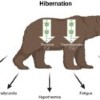Discover the most talked-about articles in the news, social media and throughout the web according to Altmetric.
- Jurassic Pork: What Could a Jewish Time Traveler Eat? by Roy E. Plotnick et al
- Eminent scientists reject the supernatural: a survey of the Fellows of the Royal Society by Michael Stirrat, R Elisabeth Cornwell
- Correcting some common misrepresentations of evolution in textbooks and the media by Kevin Padian
- Teachers teaching misconceptions: a study of factors contributing to high school biology students’ acquisition of biological evolution-related misconceptions by Tony B Yates, Edmund A Marek
- The relative importance of religion and education on university students’ views of evolution in the Deep South and state science standards across the United States by Leslie J Rissler et al


